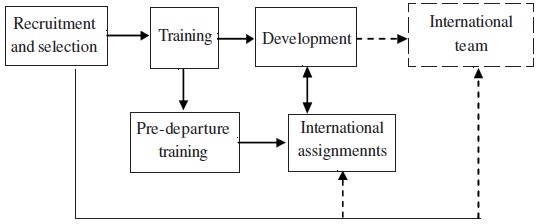Many companies are relocating their employees and sending them on assignment to work in their overseas operations as expatriates. International assignments are often more complex than domestic assignments since they involve going to another country and work in a different culture. This is where training is helpful to best ensure the success of such assignments.
Table of Content
- 1 Features of Training and Development in International Businesses
- 2 Process of Training and Development in International Human Management
- 3 Developing an International Mindset
- 4 Pedagogy of International Training
- 5 Emerging Trend in Expatriate Training and Development
- 6 Human Resources Tutorial
- 7 Human Resource Management
Features of Training and Development in International Businesses
Training develops expatriate‘s learning orientation and helps them to understand the culture of overseas destinations (Porter and Tansky, 1999). Even of its importance, many studies show that companies either do not provide or give very limited cross-cultural training to expatriates and families because of time constraints and of its high cost.
Effective training can prevent and minimise the impact of others. A study that surveyed 75 organisations in UK, Holland, Belgium and Germany showed that some of the biggest issues against expatriates are personal shortcomings in areas such as politeness, punctuality, tactfulness, orderliness, sensitivity, reliability, tolerance and empathy. Effective training programmes can minimise these personal behavioural issues. These issues arise primarily due to differences in Culture.
Training can also improve the overall management style. Research shows that many host country nationals would like to see changes in some of the styles of expatriates, including their leadership styles, decision making, communication and group working.
Proper training can address some of these demands. Training and development is a subset of Organizational Development (OD), culture change and knowledge management.
New employees after their selection and old employees on their career move, receive regular training and development inputs. However, before an international assignment, it is customary to send the candidate for post-departure training before he or she assumes full responsibility as a member of the international team.
Candidates are also given pre-departure training which emphasises on cultural awareness and business customs of the country of posting to help cope with unexpected events in a new country. This pre-departure training helps in minimising culture shock and depression that usually sets in a new country and culture.
Evans et al. (2002) describe three main issues that concern the training and development of the expatriates.
- The first one concerns the different training methods,
- Second the timing of training and
- Third issue concerns preparing the spouse and family when accompanying the expatriate during the international assignment.
Process of Training and Development in International Human Management
Following schematic model depicts the process of Training and Development in the International Human Management context.

Developing an International Mindset
Developing a global mindset and leading with cultural intelligence are two phrases that are used quite often by management teams, and that can be defined as making oneself understood where cultural differences are at play.
Training employees and giving them the tools needed to develop the global mindset needed to succeed prior to engaging in international endeavours is by far the most effective way to conduct international business and retain employees.
International teams and leaders need to change their frame of reference from a local or national orientation to a truly international perspective. This involves understanding political and cultural influences, trends, practices and international economics. Team leaders, in particular, need to understand and develop competitive strategies, plans and tactics that are external to the confines of domestic marketplace orientation.
International managers need not only to recognise the cultural differences but also to manage them effectively. If the team is to succeed, they need to develop processes for coaching, mentoring and assessing performance across a variety of attitudes, beliefs and standards.
Here are a few components of a training regiment that highlights the basic needed modifications for international success:
- Develop Relationship Skills
- Learn the Language
- Understand the Culture and the Market
- Know the Simple Differences
- Be prepared for the Marketplace
- Find a Mentor or Trusted Partner
- Have Patience
Develop Relationship Skills
Employees must master these soft skills to be excellent team players, communicators and problem solvers.
Learn the Language
Language Proficiency can play a role in refining relationship skills. One should seek opportunities to learn the language through specialised training programs or coursework that will help to adjust effectively in the host country.
Understand the Culture and the Market
From a cultural perspective, expatriates should learn what is held sacred and what is viewed negatively. Blending into the market as opposed to creating friction or embarrassment is necessary to help forge global partnerships.
Know the Simple Differences
It is also necessary to learn the basics of the market that one is working with. From time zones to measuring systems, these basics can prepare the expatriates for a smoother transition. Much of this research can be done on the internet through reliable sites before trip, call or email to show your knowledge of their practices.
Be prepared for the Marketplace
Understanding the essential elements of the international marketplace is fundamental knowledge required while working in the global domain. Having a high level of knowledge of international trade and monetary systems is part of the repository of knowledge essential to stay competitive.
Find a Mentor or Trusted Partner
Utilising the knowledge of someone with experience in the chosen market can be instrumental in helping one adjust and succeed.
Have Patience
The global market can offer unique obstacles one may not have been expecting, but the opportunity to shine on a larger scale should be valued. Time should be taken to work through challenges to appreciate the role one is in.
Pedagogy of International Training
According to Dowling and Welch (2004), studies indicate that the essential components of pre-departure training programs that contribute to a smooth transition to a foreign location include Cross-Cultural Training (CCT), preliminary visits, language training and assistance with practical day-to-day matters.
Cross-Cultural Training (CCT)
It is generally accepted that to be effective, the expatriate employee must adapt to and not feel isolated in the host country’s cultural, economic, legal and political environment. Without an understanding of the host country’s culture, the expatriate is likely to face difficulties during the international assignment.
Therefore, cultural awareness training remains the most common form of pre-departure training (Dowling & Welch, 2004). Stroh et al. (2004) refer to the three learning processes. They claim that the training should help expatriates to:
- Become aware that behaviours differ across cultures and the importance of observing these cultural differences carefully.
- Build cognitive cultural maps so that expatriates understand why the people of host country value certain behaviours, how these appear to be and how these can be appropriately reproduced.
- Practice the behaviours they will need to follow in order to be efficient in their international assignments.
The processes mentioned above reflect the importance for expatriates to be able to deal with cultural differences that he/she may confront. It builds the foundation of designing cross-cultural training for managers (Stroh et al., 2004).
Preliminary Visit: Spousal and Family Preparation
Another training form that is useful in orienting international employees is to send them on a preliminary trip to the host country. A well-planned trip overseas for the candidate, spouse, and family provides a preview that allows them to assess their suitability for and interest in the assignment. Such a trip also serves to introduce expatriate candidates to the business context in the host location and helps encourage more informed pre-departure preparation (Dowling & Welch, 2004).
Participating in the visit before formalised training eliminates many of the basic logistical questions that frequently stress expatriates and their spouses and all for full focus and concentration in Cross-Cultural Training (CCT) learning (Bennett, 2000 pg 243).
Language Skills
The result of lacking host language competence has strategic and operational implications as it limits the multinational’s ability to monitor competitors and processes of important information. Having the ability to speak a foreign language can improve the expatriate’s effectiveness and negotiating ability (Dowling & Welch, 2004).
Baliga and Baker (1985) point out, that it can improve manager’s access to information regarding the host country’s economy, government, and market. Disregarding the importance of foreign language skills may reflect a degree of ethnocentrism, which is when one believes that one’s culture is superior over other cultures.
Knowledge of the host-country language can assist expatriates and family members gain access to new social support structures outside of work and the expatriate community (Dowling & Welch, 2004).
Assistance with Practical Day-to-Day Matters
To provide information that assists relocation is another component of a pre-departure training program. Practical information makes sure the expatriate does not feel left behind during the adaptation process. Many multinational companies now take advantage of relocation specialists that help the expatriate with accommodation, suitable job and school for the spouse and children.
Language training is usually provided if the expatriate never got such training during the pre-departure training (Dowling & Welch, 2004). Another way of gaining this information is from the people that are already working as expatriates in the area and whom are willing to help the spouse and family of the new expatriate to adapt (Webb & Wright, 1996).
Usually the company will organise practical orientation programs for the expatriate, his/her spouse and family so that they get familiar with the place they are going to live in (Dowling & Welch, 2004).
Emerging Trend in Expatriate Training and Development
Some of the emerging trends in the area of Expatriates Training and Development are mentioned below:
- Over Reliance on Pre-departure Training
- Tailored Expatriate Training
- Use of Short Term Overseas Assignments
- Real-time Training
- Assessment and Development Centres
- Self-training using Electronic Media
Over Reliance on Pre-departure Training
As an aspect of broader cross-cultural training, pre-departure training programs tend to predominate. Schullion and Brewster (2001) draw attention to emerging European research which attacks the conventional wisdom behind expatriate training and development programmes.
This research questions the validity of the assumption that cross-cultural training should take place only before the international transfer. It appears that there is still much informality in training (Celeya and Swift, 2006) and it is suggested that HRD for future expatriate managers is more likely to involve frequent crossborder job swaps, and short assignments working in global multicultural teams (Forster,2000; Schullion,2001).
Tailored Expatriate Training
After reviewing some of the American models of expatriate training and development, Schullion and Brewster (2001) propose that it may be worthwhile examining further some of the European models. In particular, they point to the nature of European frameworks which have tailored made programmes to suit the needs of the individual and the organization.
They contend that in the future, a more tailored made approach to expatriate training is likely to be the way forward particularly in light of the rapidly changing training needs of expatriates (Collings et al., 2007).
Use of Short Term Overseas Assignments
It is observed that more and more large firms are increasingly relying on short-term overseas assignments instead of the traditional expatriate posting (Colings et al., 20007). These developments and initiatives suggest new ways of developing international assignees and expatriates.
Research evidence says that even the training which is provided to short term assignees is not so specific to the country and involves less extensive cross-cultural training than is offered to expatriates (Tahvanainem et al.,2005). But, it is argued that whether traditional expatriates or short term assignees all require cross-cultural training and awareness so as to reduce adjustment problems.
Real-time Training
Mendenhall and Stahl (2000) direct attention away from the traditional topic of cross cultural training to discuss future training needs that organisations must focus on. They distinguish between two types of in-country training delivery methods: traditional and real time. Traditional is the formal classroom lecture where all the expatriates receive the same content.
Hence, it is inflexible and does not meet the needs of individual assignees. Real-time delivery on the other hand is tailored to the needs of the individual in the form of personal counselling or coaching by experts. Given the advantage of real-time training, organisations incorporate it into their cross cultural training and development programmes.
Assessment and Development Centres
Another emerging issue in the development of expatriates is the use of assessment centres. Assessment centres are increasingly being used to equip expatriates with global management skills and cross cultural competency (Stahl, 2001).
These centres are designed to evaluate managers who are nominated for an international assignment on their cross cultural skills and provide feedback on their strengths and weaknesses for such assignments.
Self-training using Electronic Media
This is another emerging area in HRD for expatriates for self-training based on electronic media such as software and the internet. In some cases, the electronic training media is highly suitable for expatriate’s families and other dependents who may not be participating in pre-departure training programmes offered by the employing organisations (Mendenhall and Stahl, 2000).
International Job Rotation
International job rotation involves sending employees on a series of short-term assignments to different countries. These kinds of training are increasingly used by companies due to increasing globalisation and the need for cross-cultural skills which is making it more relevant for all employees involved in international work whether they are based in the home country or a subsidiary in a host country (Caligiuri et al., 2005; Harvey,1997).
Personal Security
Finally, the issue of personal security particularly in relation to global terrorism, as an emerging issue in the area of expatriate training and development. Also, health-related problems linked to business travel are also of consideration in training and development of expatriates. Certain countries pose a threat for foreign nationals to stay and work there and hence companies need to deal with such personal issues.
Human Resources Tutorial
(Click on Topic to Read)
Human Resource Management
Human Resources Tutorial
(Click on Topic to Read)








